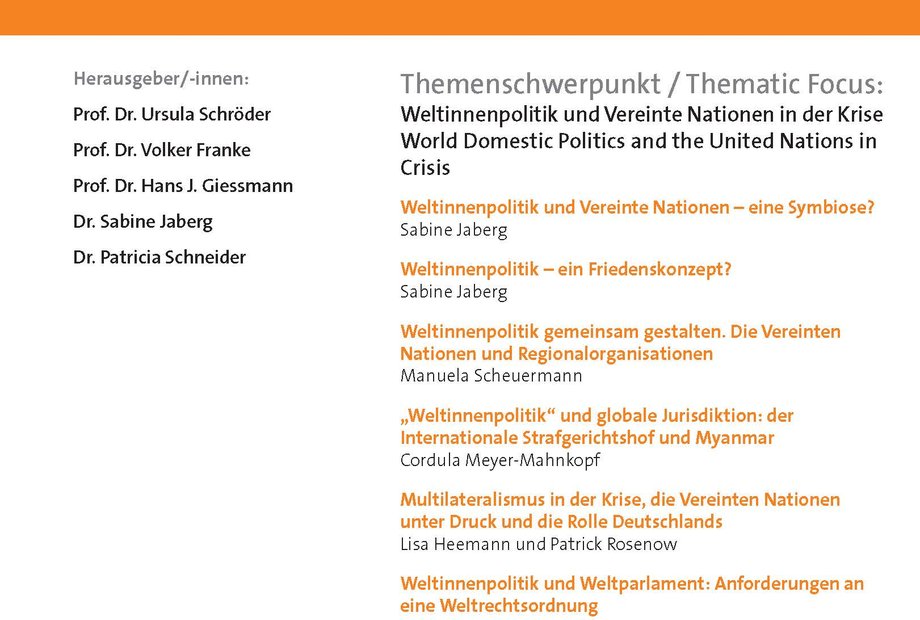World Domestic Politics (Weltinnenpolitik) and the United Nations in Crisis
Weltinnenpolitik is difficult to translate. World domestic politics seems to be the best option. Nevertheless, it contains policy as well as polity aspects. In 1963, Carl Friedrich von Weizsäcker introduced the term in the sense of bringing a world of states closer to a world state without full global monopoly on the use of force. United Nations are the organization which fits his idea best. Therefore, a crisis of the UN is a crisis of Weltinnenpolitik at the same time – and vice versa. This is where the thematic focus of the current S+F issue, this time edited by Sabine Jaberg, ties in.
In her first article, Sabine Jaberg tries to get to the core of Weizsäcker’s concept, which she distinguishes from global governance, before she compares it with the political programme of the UN-Charter. On the one hand, the Charter falls behind Weizsäcker with regard to a global monopoly on the use force. On the other hand, it is going further in matters of the separation of powers and of federalism. In her second contribution, the author searches for clues of a peace philosophy within the concept itself. In Hobbes, Kant, and – in some aspects – Elias, she has found what she was looking for. In view of the pluralism of academic approaches to peace, each component of Weizsäcker’s Weltinnenpolitik is contested. That is true for the state centrism, the inherent sparks of violence, and the tradition of European modernity. Mostly, the concept could assimilate the objections in a constructive manner.
According to Manuela Scheuermann, more than fifty years after Weizsäcker’s speech, the United Nations are sharing their responsibility for peace even with regional organizations which do not exactly correspond with the restrictions defined in chapter VIII of the Charter. Thus, the European Union (EU) claims global creative power, and the African Union (AU) aims to intervene militarily in cases of extreme violations of human rights even without being authorized by the Security Council. In essence, the author pleads for a common shaping of Weltinnenpolitik by a more intense trilateral co-operation.
Cordula Meyer-Mahnkopf concerns herself with possible answers to the atrocities committed by the Myanmar’s military against the Rohingya population. She thus focuses on the International Criminal Court (ICC) as a juridical component of an ambitious concept of Weltinnenpolitik that deserves faster implementation on its way to a global citizenship.
Lisa Heemann and Patrick Rosenow do not see the United Nations in a real crisis but rather under pressure. They impose a duty on Germany, which is a current member of the Security Council, to see the current state as a chance. In addition to a reform of its financial contribution, they plead for an offensive and militant re-narrative of multilateralism.
As a response to global challenges such as climate change, Jo Leinen and Andreas Bummel are drawing the ideal of a world republic growing from the United Nations. They direct their attention to a global legislature that should consist of a global parliament representing all people and a chamber of states. In their opinion, a parliamentary assembly functioning as an advisory body would be an institutional preliminary stage as well as a driving force for change.
In accordance with Timo Lowinger’s decolonial perspective, the boarders between Weltinnenpolitik and global governance are blurring. The author blames both approaches for universalizing western norms and eliminating matters of global rule. Nevertheless, he does not refuse them point-blank. Using India as an example, he recommends that these concepts should be further developed by focusing on resistance. Lowinger hopes this would be a first step to break up the theory-inherent exclusion of the Global South.
To sum up the findings of this volume: Weltinnenpolitik has turned out to be a theoretically, analytically, and practically autonomous perspective which deserves more academic attention and political engagement.
Contact: Dr. Patricia Schneider, schneider@![]() ifsh.de.
ifsh.de.
Link: https://www.sicherheit-und-frieden.nomos.de/index.php?id=2226&L=1





